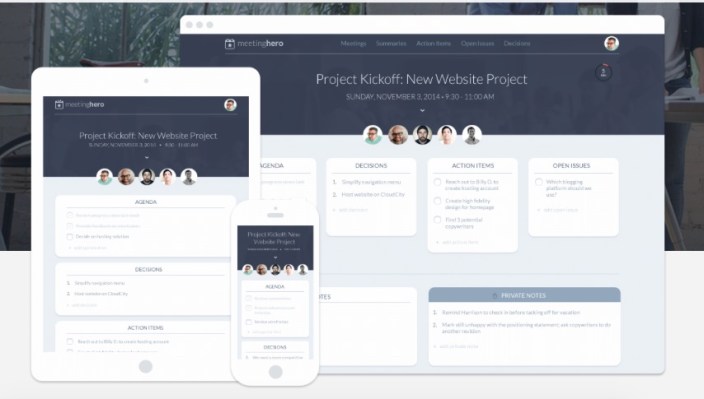I’m guessing you have been in a meeting that made you hate your life. You know, where one or two people drone on and on, half of the attendees seem to be talking past each other, and at the end no one’s sure what’s been decided or who’s responsible for doing what.
Well, a startup called WorkLife has built tools designed to make meetings better. It’s part of the current batch of startups incubated at Y Combinator, and I got on the phone last week with co-founder and CEO Dave Kashen to discuss the product.
Naturally, we used WorkLife during our call. There are other startups promising to make meetings better, but what struck me about Kashen’s product is its simplicity — it doesn’t require any big changes in existing behavior, but it could still be pretty helpful.
He told me that WorkLife divides usage into three broad categories — before, during and after a meeting. Beforehand, everyone has the opportunity to create and edit agenda items for the meeting. During, everyone can join a WorkRoom where they can track the agenda, check items off, take notes and assign tasks. There’s also a counter that shows you how much time is left before the meeting is scheduled to end. Afterwards, WorkLife sends out a meeting summary and action items, and you can also refer back to old meeting notes when you’re in a future meeting.
And yes, it works on mobile, too.
None of this might seem like it should make a dramatic difference, but Kashen suggested that the simple act of having an agenda and a clock in front of you can really help keep things on-track. If nothing else, you should be able to feel more comfortable cutting off the windbag in the room and saying, “Excuse me, but could we get back on topic?”
I also like the idea of collaborative note-taking during the meeting, since I’ve definitely been stuck on email threads where people debate what actually happened, even when one person took notes. With WorkLife, disagreement or confusion should be obvious before you leave the room and can hopefully be worked out right away.
And hey, if there are good notes, Kashen said meetings become less of a “black box.” Put another way, you could feel more comfortable skipping the meeting (assuming you don’t need to be involved in the actual decision-making), because you know that you’ll get brought up to speed afterwards.
The current service is free, but WorkLife plans to charge for premium features in the future.
Kashen, who co-founded the company with Val Agostino and Dave Bryand, spent the past few years working as a CEO coach with a focus on startup culture, and he described WorkLife as a way to improve culture on a much broader scale. Meetings are a good starting point, especially since they’re “this core building block of team culture and dynamics,” but there’s a broader vision as well, as suggested by the company’s recent name change (it was originally called MeetingHero).
“We ultimately want to build technology that helps people love their worklife, and we think more effective meetings are a really high-leverage way to do that,” Kashen added.
I also asked whether it’s strange for a CEO coach to be part of an incubator program where he’s taking lots of advice from from other people, but he laughed and said, “There’s always more to learn.”
